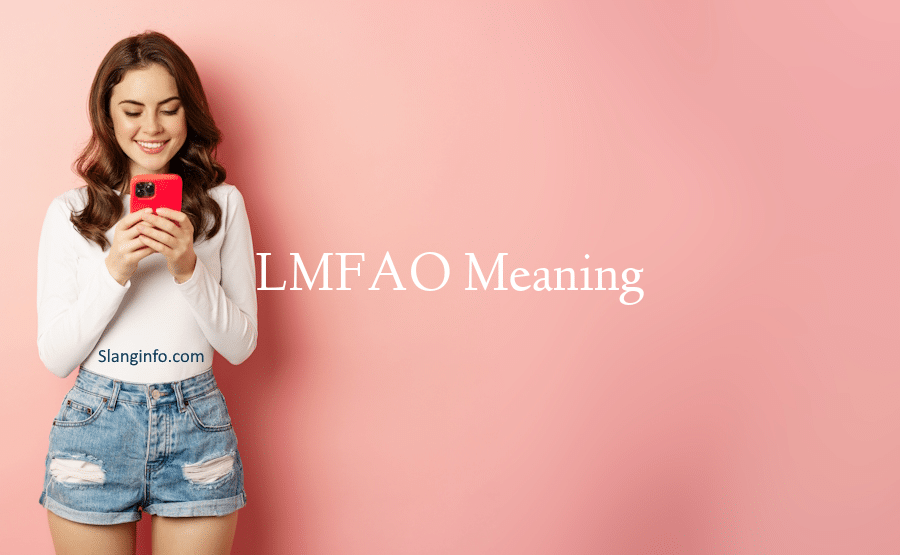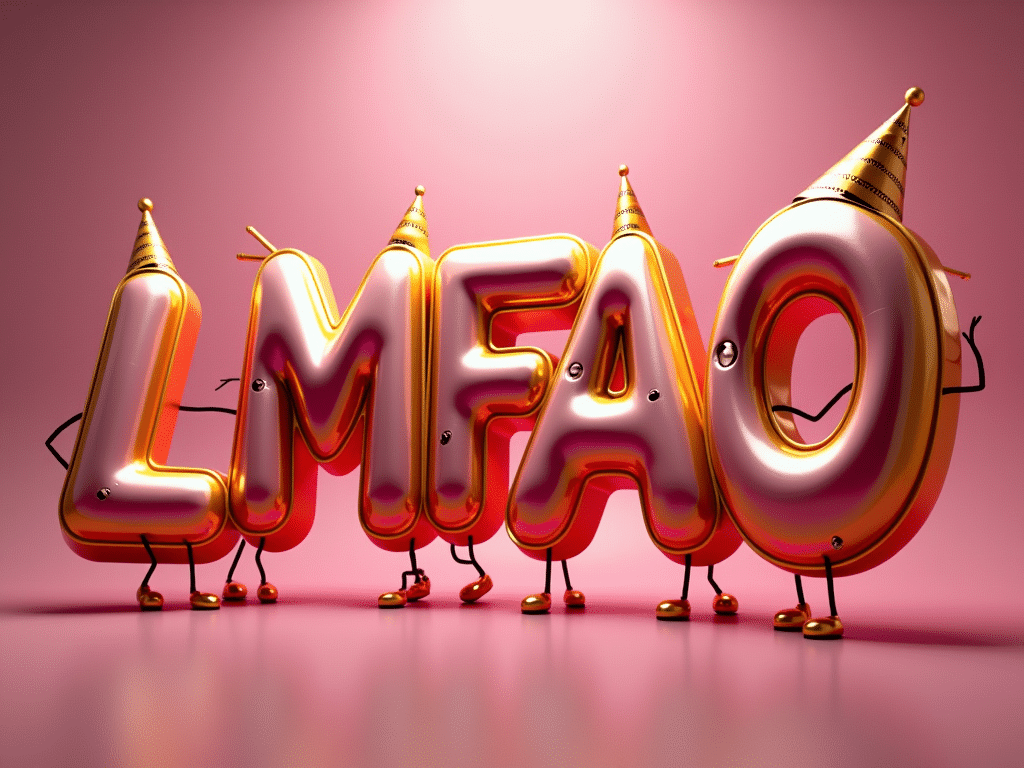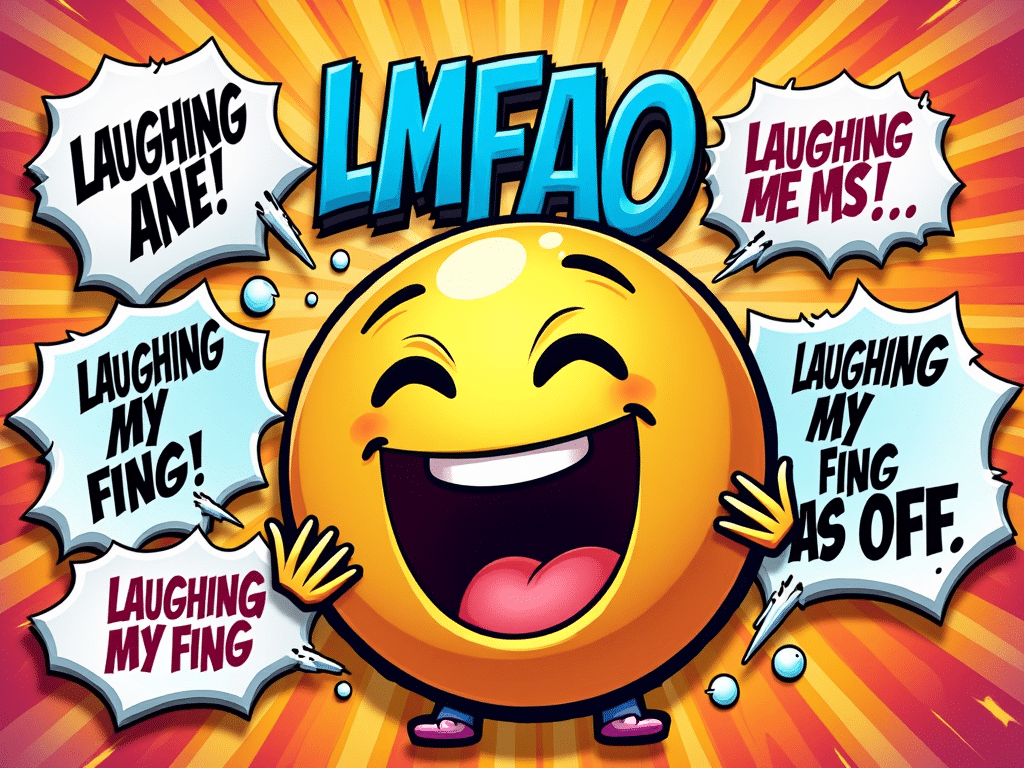LMFAO is an internet slang term that’s taken the digital world by storm. Whether you’re scrolling through your social media feed or texting with friends, chances are you’ve come across this acronym. Let’s dive into the world of LMFAO and uncover its meaning, usage, and cultural impact.
| Key Takeaways |
|---|
| Meaning: Laughing My F**king/Freaking Ass Off |
| Origin: Early 2000s |
| Usage: Text messages, social media, informal digital communication |
| Purpose: Express extreme amusement or hilarity |
| Tone: Casual, informal, potentially vulgar |

Definition and Origin
LMFAO stands for “Laughing My F**king Ass Off” or, in a more polite version, “Laughing My Freaking Ass Off”. This acronym originated in the early 2000s and gained popularity through its use in text messages and social media platforms.
Usage and Context
LMFAO is typically used to express extreme amusement or hilarity in response to something incredibly funny. It’s a more emphatic form of LMAO (Laughing My Ass Off). The acronym is commonly used in the following contexts:
Digital Communications: LMFAO is frequently seen in text messages, social media posts, and online chats.
Reaction to Humor: It’s often used as a response to jokes, memes, funny stories, or comedic content shared on social platforms.
Emphasis on Amusement: LMFAO indicates a heightened degree of hilarity, suggesting a reaction similar to a hearty chuckle or roaring laughter rather than a subtle giggle.
Examples in Context

Here are some examples of how LMFAO might be used in digital conversations:
- “Just saw your Snapchat story, LMFAO! 😂”
- “That joke had me LMFAO! Where did you hear that one?”
- “I can’t believe we wore the same outfit to the party… LMFAO, what are the odds?”
Considerations and Etiquette
While LMFAO is widely used, it’s important to consider the context and audience when using this acronym:
- Appropriateness: Due to its potentially vulgar nature, LMFAO may not be suitable for all situations or audiences.
- Tone: It’s generally used in casual, informal settings and may not be appropriate for professional or formal communications.
- Variations: Some people may use a less vulgar version, such as “laughing my freaking ass off,” to maintain a more polite tone.
Cultural Impact
LMFAO has become deeply ingrained in internet culture and digital communication. Its widespread use reflects the evolving nature of language in the digital age, where abbreviations and acronyms play a significant role in expressing emotions and reactions quickly and efficiently.
Variations and Related Terms
LMFAO isn’t the only acronym in town when it comes to expressing laughter online. Here are some related terms:
- LOL: Laughing Out Loud
- ROFL: Rolling On the Floor Laughing
- LMAO: Laughing My Ass Off
- ROTFLMAO: Rolling On The Floor Laughing My Ass Off
Each of these serves a similar purpose but with varying degrees of intensity. Think of it as a laughter scale, with LOL being a chuckle and ROTFLMAO being uncontrollable laughter.
LMFAO in Pop Culture

Interestingly, LMFAO isn’t just internet slang – it’s also the name of a popular electronic dance music duo! The group, consisting of Redfoo and SkyBlu, chose the name LMFAO as a nod to internet culture. Their hit songs like “Party Rock Anthem” and “Sexy and I Know It” dominated charts in the early 2010s.
The Evolution of LMFAO
The use of LMFAO has evolved over time. Here’s a quick look at its journey:
- Early 2000s: Emerged as internet slang
- Mid 2000s: Gained popularity in text messages
- Late 2000s: Widely adopted on social media platforms
- 2010s: Became part of mainstream internet culture
- Present: Still widely used, but sometimes seen as dated by younger users
Pros and Cons of Using LMFAO
| Pros | Cons |
|---|---|
| Quick way to express extreme amusement | Can be seen as unprofessional in formal settings |
| Widely recognized and understood | Potentially offensive due to implied profanity |
| Adds emphasis to your reaction | May be overused, diluting its impact |
| Part of internet culture and community | Could be seen as dated by some younger users |
LMFAO Across Platforms
Different social media platforms have their own LMFAO culture:
- Twitter: Often used in reaction to viral tweets or memes
- Instagram: Commonly found in comments on funny posts or Stories
- TikTok: Used in video captions or comments, sometimes replaced by laughing emojis
- Snapchat: Frequently used in private messages or captions on funny Snaps
The Future of LMFAO
As internet slang continues to evolve, what’s next for LMFAO? While it remains popular, new expressions and emojis are always emerging. Some predict that video reactions or voice messages might eventually replace text-based expressions like LMFAO.
Remember, language is always changing, especially online. Whether you’re an LMFAO enthusiast or prefer other ways to express your amusement, the key is to communicate effectively and have fun doing it. So next time something has you laughing uncontrollably, don’t hesitate to throw out an LMFAO – just make sure your audience will appreciate it!







